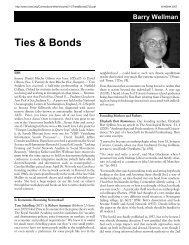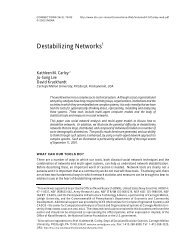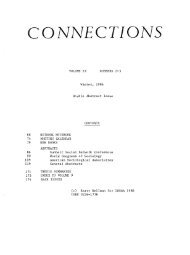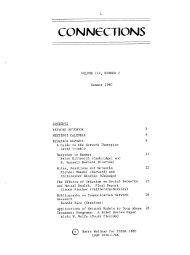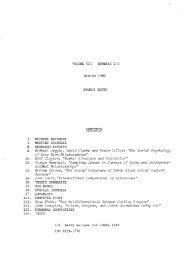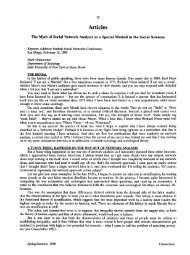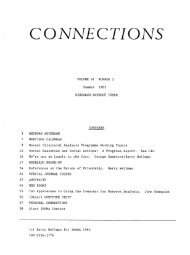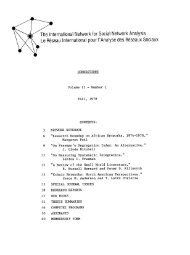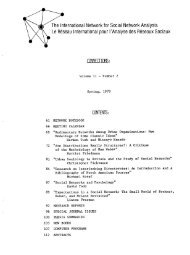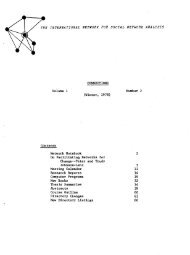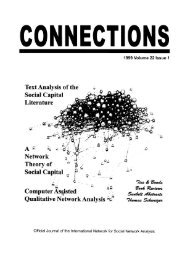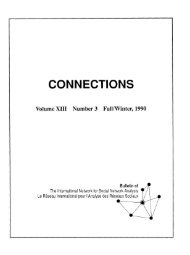Sunbelt XXXI International Network for Social Network ... - INSNA
Sunbelt XXXI International Network for Social Network ... - INSNA
Sunbelt XXXI International Network for Social Network ... - INSNA
You also want an ePaper? Increase the reach of your titles
YUMPU automatically turns print PDFs into web optimized ePapers that Google loves.
Macrostructure From Survey Data: Generating Whole Systems From Ego <strong>Network</strong>sSmith, Jeffrey A.Analyzing <strong>Network</strong> DataSampling, Exponential Random Graph Models, Simulation, Ego‐centered <strong>Network</strong>sSAT.PM1This paper presents a new method to make global network inference from sampled data. The proposed simulation method takes ego network, or local level,data and uses Exponential Random Graph Models (ERGM) to construct the full (unknown) network from which the ego networks were sampled. Afterdescribing the method, I present two validity checks using known, empirical networks: the first uses the 20 largest Add Health networks while the second usesthe Sociology Coauthorship network in the 1990’s. For each test, I take random ego network samples from the known networks and use my method to makeglobal network inference. I find that my method successfully uses ego network data to reproduce the properties of the known networks, such as distance andmain component size. The results also suggest that simpler, baseline models provide considerably worse estimates <strong>for</strong> most network properties.Management Systems And The <strong>Social</strong> Capital Of Knowledge Workers In Virtual EnvironmentsBiseda, Marlene A.<strong>Social</strong> CapitalOrganizations, <strong>Social</strong> Capital, Virtual Environments, Management Systems, theory‐buildingFRI.AM1Working in geographically dispersed organizations is increasingly becoming the reality <strong>for</strong> knowledge workers. Working virtually can provide a sense ofautonomy, but also a sense of isolation. Similarly, managers have additional challenges when they and their employees are not co‐located, especially whenthey must integrate new employees into the firm. Managers spend time and resources to develop systems that replace the in<strong>for</strong>mal meetings and discussionsthat happen naturally in traditional offices. The resultant infrastructure is expected to enable virtual employees to develop relationships with other membersof the organization. This paper examines how knowledge workers develop a network of relationships during their initial years in geographically dispersed firms.It assesses effectiveness of the organizational infrastructure (the roles, processes, and in<strong>for</strong>mation technology) in place to enable the building of social capitalin the virtual environment. Three cases were studied: auditors in a regional practice of a Big Four accounting firm, project managers in the professional servicespractice of a global technology company, and executive managers in a business unit of a global manufacturing company. 42 participants were interviewedabout the use and perceived value of the organizational infrastructure to develop relationships. The quantitative assessment and key drivers of value arepresented. Similarities across cases and differences based on firm context are discussed.



